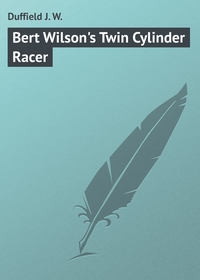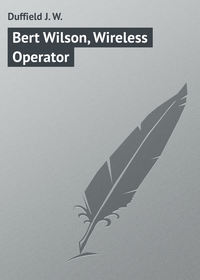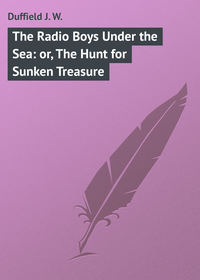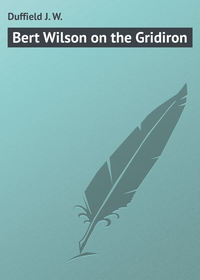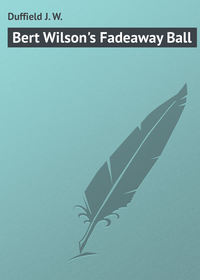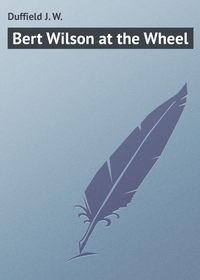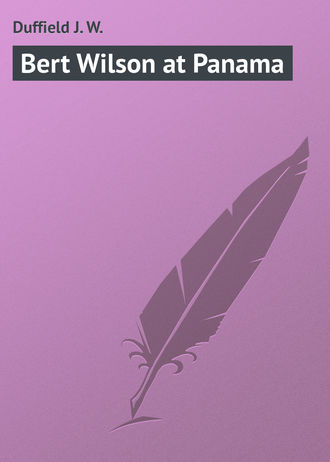 полная версия
полная версияBert Wilson at Panama
"It certainly is," agreed Bert, with a laugh, "but I'm afraid the 'somebody else' might not appreciate your philosophy."
"Oh, that's all right," said Dick. "Some time when I'm working, the other fellow is welcome to watch me, and then he'll be getting his rest."
"Huh," remarked Tom. "I'd hate to have to wait for my rest until you started laboring. I'm afraid I'd surely die from overwork before that happened."
"Oh, don't worry about your dying from overwork," retorted Dick, "that's my idea of the last thing in the world to be afraid of. What do you think, Bert?"
"Oh, I don't imagine any of us will get heart failure very soon from that cause," laughed Bert, "but here we are at the workings already, so let's proceed to take your 'rest cure,' Dick."
It seems hardly probable, however, that any invalid, suffering from "nerves" or some kindred disorder, would have selected this as an ideal place to recuperate. Everywhere the greatest activity was apparent, and the combined din of the different machines was a thing to be remembered. A steam shovel rattled and puffed, cement mixers crashed, and compressed air drills hammered perseveringly at the living rock. Every once in a while, work would cease at some point, and the laborers would stand around expectantly.
Then there would come a muffled roar from some exploded blast, and a cloud of rocks, dirt, and smoke would shoot upwards. Then the men would fall to again with renewed energy, the giant steam shovel would be set to work, and a few more yards of rock would be carried away.
Thus the work proceeded without intermission, and the boys, although now somewhat used to the sights, looked on fascinated. There was something very wonderful and awe-inspiring about the whole process that held the boys spellbound.
"Just think of it," said Bert, after a long silence. "Imagine us standing maybe half a mile away from this canal and seeing some big ocean liner going through it. Why, it will look as though the ship were going over the solid ground."
"That's what it will, all right," replied Dick. "It's certainly the biggest thing ever."
"I should think it was," said Tom. "I can't think of anything else that even compares with it.".
"No, neither can I," said Bert, thoughtfully. "That is, no practicable project. Of course wild schemes come up now and then to change the earth's course, or some other crazy idea like that. I remember reading of a plan like that somewhere. It seems its originator, whoever he was, planned to build a great ring of iron all around the earth at the equator, and then charge it with electricity. He figures that the immense magnetic attraction generated in that way would change the earth's course by acting on neighboring planets. I haven't much confidence in the plan, though," and, as Bert said this, he looked at Tom, slyly.
"Confidence!" exclaimed Tom, with a contemptuous snort. "Why, of all the fool schemes I ever heard of that's the limit. I shouldn't think you'd even – " but here he caught the twinkle in Bert's eye, and stopped abruptly.
"Ha, Ha!" roared Dick, "my, but you had Tom going that time, Bert, he thought you were in earnest about that."
"Well, why shouldn't I think he was in earnest?" growled Tom. "He's pretty near foolish enough even to believe in a demented idea like that. I wouldn't have been surprised if he had."
"Well, never mind, old timer," said Bert, "I put one over on you that time, though, I guess. You'll have to admit it."
"Yes, I guess you did," said Tom, "but I'll get even for that sometime.
Don't be surprised if you find a little rat poison in your soup some day.
That's the only punishment I can think of that would fit the crime."
"Oh, that's all right," laughed Bert. "If it's like most rat poisons, all it will do is to make me fat and strong. I remember a friend of mine whose father was a farmer. He was telling me how his father scattered poison all around his barn in the hope of killing off a few of the pests, but he said that all the effect it seemed to have was to make them hungry, so that they ate more grain and feed than before. Maybe that's the way it will work with me, only the comparison isn't very flattering."
"It isn't, for a fact," said Dick, "but I hope in this case Tom isn't as blood thirsty as he sounds."
"Well, I might be persuaded to postpone the execution," admitted Tom, with a grin. "I'm always open to an offer, and a little matter of a five dollar bill or so would buy me off."
"All right, consider yourself paid," said Bert. "I'd rather owe it to you all my life than cheat you out of it."
"Much obliged, I'm sure," replied Tom, sarcastically. "As soon as I get the five spot I'll blow you both to a swell dinner."
"Good night," exclaimed Dick. "I hope I don't have to go hungry until that happens. I have a feeling that I'd lose considerable weight."
"You'll have a long wait, that's certain," replied Tom, and prepared to take to his heels.
The only indication Bert and Dick gave that they heard this atrocious pun was a couple of hollow groans and melancholy head shakes.
"Poor old Tom," mourned Dick at length, "poor old Tom. I've feared for some time he was going off his head and now I know it. That's proof beyond question."
"Don't let it turn your hair gray," retorted Tom. "As long as I don't worry about my condition you don't need to. But I'll promise to be good and not do it again, anyway. That was a pretty rotten joke, I'll have to admit."
"That's all right," said Bert, "we forgive you. I'm glad to see that you realize what a crime it was."
After this they fell to discussing the events of the day before, and became so interested that they could hardly believe it was lunch time, when the whistles blew and the men threw down their tools and prepared to take a well earned rest for a brief hour. "Well," said Bert, glancing at his watch, "I guess it's about time we hit the trail toward the nearest eats emporium. Now that its called to my attention, I begin to realize that I'm hungry."
The others also discovered symptoms of a healthy appetite, so without further loss of time they hurried back to their 'base of supplies' as Tom put it.
"If we're as hungry as this without having done much all the morning, what would we be if we had been working since eight o'clock?" queried Dick, and the others were unable to give him a satisfactory answer.
"I guess they'd have to stop work, owing to a shortage in the food supply," said Bert, and his companions laughingly agreed with him.
They made a hearty lunch, and then returned to the scene of the excavations. There were a thousand interesting things to watch, and the afternoon passed very quickly. Their attention was specially attracted by one giant steam shovel that rattled and puffed like some untiring monster. The engineer guiding it directed its every motion with a touch of one of the levers close to his hand, and it seemed as though the machine were a living creature and he its brain. The great scoop would drop with a roar of chains passing through pulleys, and then, as the main engine began to puff, would rise slowly but with irresistible force.. Then a pair of auxiliary cylinders mounted on the beam of the shovel would begin to work, and the big scoop with its load of dirt and rocks would swing around and stop over one of the dirt cars. The engineer's assistant would pull a rope attached to the scoop, a catch would be released, and the bottom of the scoop would swing open, letting the load fall into the waiting car. This process would be repeated again and again, and then, when the shovel had scooped up all the dirt around it, it would be moved forward a few feet, under its own power, to a new base of operations.
It seemed that its power was almost limitless, but at last there came a time when the boys thought it would meet an insurmountable obstacle. Close to where they sat, a big stump projected from the ground. Part of its gnarled and twisted roots was exposed, but a good deal of it was firmly imbedded in the earth. The steam shovel had worked its way along, until now it had reached a spot directly in front of this stump. The boys thought that some laborers would be sent to uproot it, so that the shovel could proceed, but there was no sign of this being done.
"Say!" exclaimed Dick. "I'll bet any money they mean to uproot that stump with the shovel, but I don't believe it can be done. Why, it would take a charge of dynamite to get that up."
"It certainly looks pretty solid," said Bert, "but they must know what they're doing. We won't have to wait long, though, to find out. Look! they're bringing the scoop up under it now!"
The three comrades watched intently as the big scoop dug in under the stump. As it came fairly up against the obstacle it slowed and almost stopped, and the boys caught their breaths. But the engineer opened the throttle a trifle more, and the stump moved! Slowly it gave way, one root after another snapping off with a loud report, and at last was lifted clear of the ground.
"Well, what do you know about that!" exclaimed Tom. "I thought the old steam shovel was up against it for fair, that time."
"So did I," said Bert, "but it fooled us good and proper."
"It's such things as that steam shovel that make the canal possible," said Dick, "just imagine the time it would take to dig that stuff out by the old method of shoveling. Why, it would take so long that we'd never live to see it finished."
"Yes, I guess you're right," said Bert, "and look at those compressed air drills working over there. Think how long it would take to bore out those holes by the old method of hammering a drill into the rock. There's no doubt, that, as you say, modern machinery is the only thing responsible for this work. It's a wonderful thing, any way you look at it."
It was indeed a subject admitting of much speculation, and the boys never tired of talking about it. In this way the afternoon passed very quickly, and when work was stopped they returned to their quarters.
On the way back, Bert said, "We might as well make arrangements now as later, fellows, for going to see Mr. Hartley. You know we promised to call on him to-morrow. What time shall we get there?"
"Oh, I should think right after lunch would be about the best time, don't you?" said Dick, and as there seemed to be no objection to this plan, they adopted it unanimously.
They arose early the next morning, and had ample time to take a long walk before breakfast. "Not that it's at all necessary," remarked Bert, "I don't very well see how any of us could have much better appetites than we have already."
"Yes, but if we didn't get all the exercise that we do, the appetites might not last very long," replied Bert.
They did not prolong their ramble long enough to interfere with breakfast, and got back to their quarters just in the nick of time.
"Another ten minutes," exclaimed Tom, "and we would have missed some of the eats. We certainly do have close escapes from disaster at times."
"It would certainly have been an awful calamity," grinned Bert, "but I think we must have some sixth sense that leads us back here in time for meals. I don't remember that we have ever been late to one yet."
"No, and we're not going to be, if I can help it," said Dick, and they all fell to in earnest.
Breakfast over, they selected a level spot not far from their quarters and had a "catch." Bert found his arm somewhat rusty, as he had not done any pitching to speak of for quite a while, but soon limbered up, and began "shooting them over" in his old time form. The morning passed quickly in the pursuit of this and other athletic exercises, and after a light luncheon the three comrades set out to visit Mr. Hartley in accordance with the plan they had formed the day before.
It was not a long walk to the engineer's tent, and they made short work of it. Needless to say, Mr. Hartley was more than glad to see them, and expressed himself cordially.
"Sit down, sit down!" he said heartily, after he had shaken hands with them. "I've been looking forward to this visit with great pleasure. I'm used to a pretty active life, and I hate to be laid up even for a day. The doctor tells me I've got to have a complete rest for a few days, though, and I suppose he knows best."
"Well, the doctor isn't always right in these cases," said Bert, with a smile, "although he probably is in this. I remember a good joke I heard about that once."
"Go ahead and tell it to us," urged Mr. Hartley.
"Oh, it's about an Irishman, Mike we'll call him, who had been sick for a long time. At last the day came, when, to all appearances, he had finally given up the ghost, and the family physician was as called in more as a matter of form than anything else. He made the customary tests, and at last pronounced poor Mike dead. But just then Mike suddenly sat up in bed. 'You're a liar, docther!' he said. 'Oi'm not dead at all, at all.' But at this point his wife stepped up. 'There, there, Mike,' she said, soothingly, 'lie down again. The `doctor knows best.'"
There was a roar at this.
"Ha, ha!" laughed Mr. Hartley, "that's a pretty good one. That man must have held a large life insurance policy, I should say, judging by his wife's conduct."
"Very likely," grinned Bert. "But I can't vouch for that."
Mr. Hartley then related one or two of his pet stories, and soon they were all on the best of terms. After a while the conversation drifted around to local topics, and the boys were much interested in Mr. Hartley's description of places and happenings in the country bordering the "big ditch."
"Yes, there are more curious and unheard of places in this little strip of country than in any other place I know of, comparable to it in size," he said. "Why, if a quarter of the stories the natives tell are true, it is a veritable wonderland. And I think some of them are true. With my own eyes I have seen some of the things they talk about."
"Tell us of some of them, won't you?" requested Bert, and the engineer seemed nothing loath.
"There is one experience in particular that comes to my mind," he said, "that I have always meant to follow up at the first opportunity. It was while quite a party of us were out hunting, with three of the natives as guides. It was along toward the beginning of operations on the canal, and we were held up by a delay in delivering some of the machinery, so had plenty of time on our hands. Well, as I say, we started out bright and early one morning, led by the three guides, who had brought a strange story into camp. They told us of a ruined city they had discovered in the heart of the jungle. According to them, this old town covered miles of territory, and was presided over by some demon who claimed the lives of all who penetrated within its boundaries. And we were led to give some credence to their story by the fact that while they agreed to guide us to the city, they expressly stipulated that we should not require them to guide us further than its boundaries. They would stay outside, they said, and take the news of our death back to camp. They seemed to have no doubt that the demon would 'get us,' and you may be sure our curiosity was greatly excited.
"I and four others of the corps of construction engineers resolved to run this mysterious devil to the ground, and so, as soon as we could make the necessary arrangements, started out. We soon entered the jungle, and made steady progress. As far as we could judge we went almost due south. We traveled with hardly a stop other than long enough to eat, that first day, and only stopped when darkness made further progress impossible.
"We were up bright and early the next morning, and about noon caught our first glimpse of the ruined city. Way down a clearing in the jungle, we could see tall white pillars, many of them partly hidden by creeping vines.
"We all broke into a run, and in an hour or so were on the outskirts of the old city. And believe me, my lads, at one time that had been a city with a capital C! It had evidently been laid out in well ordered streets and squares, and everywhere houses were bordered by the remains of what had been great temples and buildings. Most of them were on the ground, mere heaps of ruins, but a few were still standing, at least in part, and we could get a faint idea of what the old city must have been in those far off days of its prime. At present, though, it seemed to be the abode only of wild things.
"We gazed in wonder at this sight for some time, and then held a pow-wow. We had a long discussion as to whether we should start exploring at once, or wait till the next morning.
"We finally decided on the latter plan, as, in spite of our blastings about wanting to shake hands with the presiding devil, we really had no great hankering to meet him after dark. Of course, we none of us believed in that 'devil' business, but still we had no doubt that some secret menace hung over the old city. The guides were positive on this point, and as they had been right so far, we were inclined to give their opinions some consideration."
Here Mr. Hartley paused as though to gather his thoughts, and the three boys, who had been listening intently to his narrative, drew a deep breath.
"My!" exclaimed Tom, "make out we wouldn't like to have been with you then."
"Yes, I daresay you would," said Mr. Hartley, with a smile, as he noted the eager longing in the eyes of his listeners. "I think it would have been an adventure after your own heart. But wait till you hear the rest, and you may be glad you were not along."
"I doubt it," said Bert, "but go on with the story, if you please, Mr.
Hartley."
CHAPTER XI
THE DESERTED CITY
"Well," resumed Mr. Hartley, "we made camp, as that appeared to be the desire of the majority, and turned in, as soon as we had eaten supper. We were all dead tired after the long journey, and I guess none of us were troubled in our sleep by thoughts of the strange spirit of evil that ruled the city, according to the natives. It's a lucky thing, sometimes, that you can't see into the future. If we could have done so that night, our sleep might have been less sound.
"We were awakened by the guides, who had already prepared a good breakfast for us, and you may be sure we all ate heartily, both because it tasted good and because we wanted to start out on our exploration in good trim.
"The meal despatched, we entered the ruins by what had apparently at one time been a great gate, but which now was nothing but a twisted heap of stone. Evidently the city had been encircled by a wall, but this had crumbled away and was overgrown by the tropical vegetation.
"Of course, we had to leave the guides behind us, as they positively refused to pass the boundaries. This didn't cause us much worry, however, for we knew from experience that, when it came to trouble, they were of little use.
"The ruins lay before us apparently devoid of any human inhabitants. At first we didn't know which way to go, but finally decided to make straight for what looked to have been the center of the town. As well as we could make out, all the streets seemed to converge toward that point, which had no doubt been the public square.
"We followed this plan, but as we went along were often tempted to alter it. More than once we passed some building that seemed in better repair than the others, and of course we wanted to explore it. But we thought it would be no use examining lesser ruins, when greater ones were at hand. For, as we got nearer the center of the town, we could see that the square was occupied by a building much more pretentious than any we had seen so far. From a distance it had looked merely like a jumbled mass of ruins, but when we at last stood before it we could see that such was far from being the case.
"To be sure, the building was in a ruinous condition, but, probably owing to its having originally been built in a more solid fashion even than its neighbors, it was in comparatively good preservation. Even the roof appeared intact in places, and we marveled as we gazed at it. Great columns rose tier after tier, interspersed with solid walls of granite, until they supported a roof at least eighty or a hundred feet from the ground. The facade was ornamented profusely with carvings of men and animals, some of them very well done, indeed.
"We realized that this building and its fellows must have been the production of some highly developed form of civilization, and many were the speculations as to who the ancient people could have been.
"But we soon got tired of looking at the outside, and were all seized with a desire to explore the wonderful place. Its main entrance was little obstructed, and there was nothing to prevent our going in. It was as black as pitch inside, although the sun was shining brightly, and we cast about for same means of lighting the interior. We secured some resinous fagots from a great tree that had sprung up near by, and found that they burned brightly and would serve our purpose perfectly.
"Each one of us armed himself with one of these, then, and took another along in reserve. In this fashion we invaded the ancient temple, for such we believed it to be, not without, it must be confessed, a rather chilly feeling in the neighborhood of the spine. At least, I felt that way, and I have no doubt the others did, too. However, we all carried revolvers, and felt confident that if the mysterious 'demon' attacked us, we would be able to give him a sharp argument.
"Nevertheless we kept closely together, and were inclined to believe firmly in the old adage that 'in numbers there is strength.' We had no difficulty in climbing over the fallen blocks encumbering the entrance, and soon found ourselves fairly on the inside. The place had a damp, earthy smell, and the air was very close and oppressive. It was black as pitch, too, and the light from our improvised torches did little to dispel the gloom.
"However, it would never do to back out now, so we advanced cautiously, stumbling every once in a while over some fallen piece of masonry. Our footsteps rang and echoed under the great vault that we could hardly see, so lofty it was. It seemed almost sacrilege to disturb the silence of this building, that had probably not echoed to human footsteps for centuries.
"We kept on, nevertheless, until we were halted suddenly by an exclamation from one of the men in front.
"Look, look!" he exclaimed, pointing with a trembling finger. We followed its direction, and I distinctly felt my hair rise on my head.
For there, high up near the roof, two green eyes glared down at us with a baleful sparkle! They glinted and glowed, and a gasp went up from our little party.
"'By all that's holy, what is it?' whispered Tom Bradhurst, my special friend.
"No one answered, but we all got a tight grip on our revolver butts. We gazed, fascinated, at those two lambent points of light, fully expecting to come to hand grips with the 'demon' then and there. As nothing happened, however, we plucked up courage enough to advance cautiously, and were soon near enough to make out the cause of our fright. The eyes were two great emeralds set in the head of a colossal idol carved out of a great block of solid granite! The image must have been at least thirty feet high, and the emeralds were each as large as a robin's egg.
"'Great Scott!" ejaculated Bob Winters, another of our party, "that thing
has scared me out of ten years of life, and I'm going to have my revenge.
I'm going to climb up there and get those emeralds, if it takes a leg.
Why, there'll be a fortune in them for all of us."
"We tried to dissuade him, for our nerves had been shaken, and we didn't want to monkey with the confounded things. Bob was always a dare-devil chap, though, and set on having his own way. So he went at it, climbing nimbly up the front of the image, until he was in a position to touch the great emeralds. Then he drew his hunting knife and commenced prying away at the stones to dislodge them.
"Suddenly he gave the most unearthly shriek it has ever been my lot to hear, threw his hands up over his head, and started sliding down the steep front of the statue. While the shriek yet rang in our ears, a great section of what had appeared to be solid rock flooring at the base of the idol opened inward, and our comrade's body hurtled through the aperture and disappeared from our sight. His hunting knife rattled on the stones at our feet, and then all was silence.


